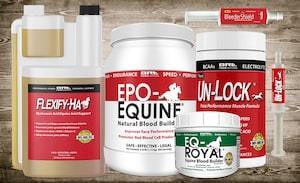
Your senior horse may be calmer, sweeter and wiser, but sadly, his muscles and joints may be declining. And while you can't stop the aging process, there are some simple steps you can take to slow it.
How Your Horse Ages Like You
Your horse ages at about triple the rate you do and experiences many of the same aging issues as humans:
- His body loses collagen.
- His teeth roots slowly move downward.
- His eye sockets hollow.
- His topline sags.
- His back sways.
- He gets cataracts.
- His heart function decreases.
- His digestion system slows.
- His immune system weakens.
- He experiences joint degeneration and maybe arthritis.
Negative Effects of Reduced Joint Elasticity
When a horse experiences reduced muscle mass and joint flexibility, it can negatively affect his physical performance, including:
- Exercise tolerance
- Endurance
- Speed
- Agility
- Strength
All this can put your horse at higher risk of injury. However, you can reduce this risk by taking some proactive steps.
How to Maintain Your Senior Horse's Muscle Function
Try these simple tactics to maintain or even improve your older horse’s physical health:
1. Reduce stall time. While stall rest may be necessary, too much can cause other issues, such as stiffness and swelling, reduced blood flow resulting in muscle cramping, and muscle mass deterioration. If you're not sure how much stall time you should allow your older horse, check with your vet.
2. Exercise Your Horse Regularly. Even though your senior horse might not be able to exercise at the levels he used to, he still has aerobic capacity and needs regular physical activity Your vet can determine appropriate exercise duration and endurance levels that are best for his age and health.
3. Check His Teeth. For optimum health levels, your horse needs proper nutrition. If he has bad teeth, he can't chew properly and may not get all the nutrients he needs. An equine dentist can determine your horse's oral health and identify current or potential problems. A regular dental routine can reduce the chances of poor nutrition, which can greatly improve senior health.
4. Maintain a Regular Worming Schedule. Good health can be sidelined by a bad parasitic infection. In older horses, it can be even more detrimental. If you haven't already, start a good de-worming program. If you’re unsure how, ask your vet to outline a schedule.
5. Consider a Natural Supplement. With a thorough physical exam of your horse, your vet can determine what nutrients he may lack. Many older horses experience reduced nutritional absorption and digestive issues; these can impact muscle mobility, cramping, muscle mass and stiffness. All these can directly affect your horse's performance and exercise routine.
To reduce joint stiffness and connective tissue degeneration, Julia M. Getty, Ph.D., recommends a nutritional supplement that contains branch chain amino acids, and vitamins such as C and E. All these ingredients and more can be found in Un-Lock, an advanced muscle recovery formula that's all natural.
Daily use of Un-Lock can reduce muscle loss, fatigue and cramping, and aid in injury recovery. Ask your vet if your senior horse can benefit from Un-Lock. The sooner you order your first bottle, the sooner your horse can be on his way to a longer, healthier and more active life!
Top trainers, owners and competitors rely on BRL Equine products to help their horses perform at their very best. You can get the same great results! Our all-natural equine nutritional supplements really work... guaranteed or your money back!





Also in Horse Tips and More
Top 10 Ways to Show Your Horse You’re Thankful For Him
November 01, 2021
View full article →
5 Ways to Prepare Your Barn For Summer
May 03, 2021
View full article →
Your New Spring Horse Health Checklist
March 12, 2021
View full article →